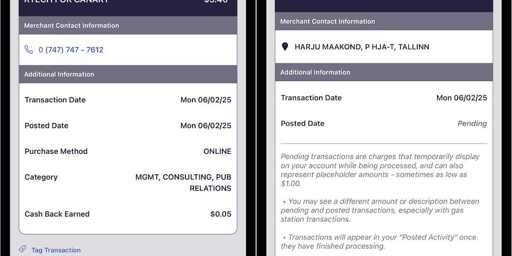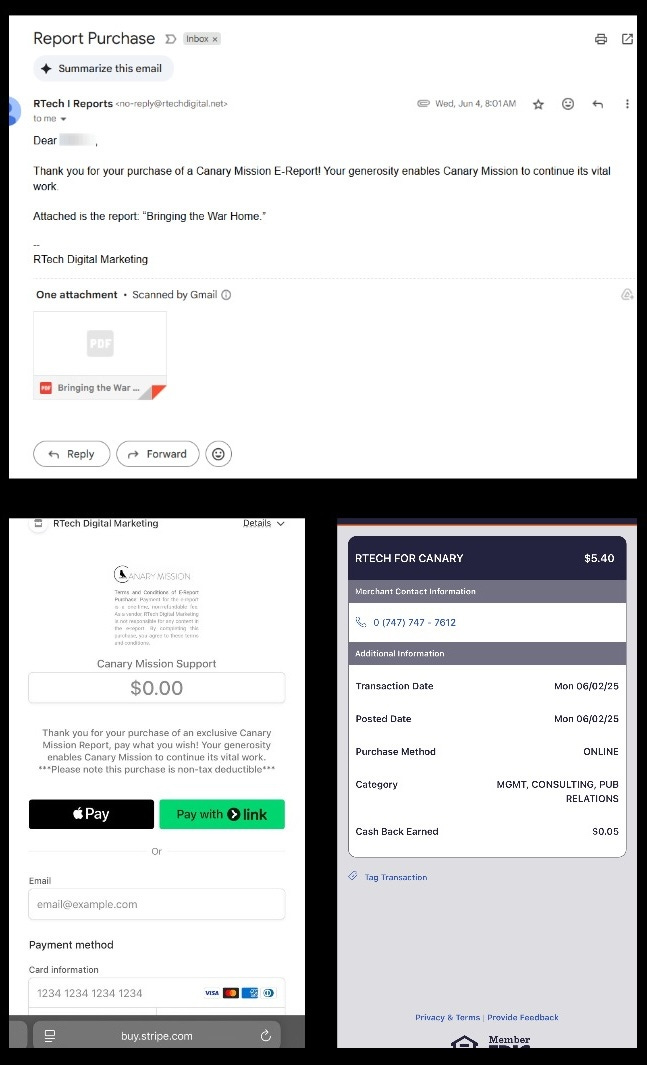We have a commitment to ensuring that our journalism is not locked behind a paywall. But the only way we can sustain this is through the voluntary support of our community of readers. If you are a free subscriber and you support our work, please consider upgrading to a paid subscription or gifting one to a friend or family member. You can also make a 501©(3) tax-deductible donation to support our work. If you do not have the means to support our work financially, you can do your part by sharing our work on social media and by forwarding this email to your network of contacts.
When Canary Mission began “doxxing” people for expressing pro-Palestine views a decade ago, the shadowy group mostly found traction among pro-Israel advocates who lobbied, with mixed success, to put a blacklist into effect. The group’s dossiers on activists and students led to firings, harassment, and death threats against its targets. Canary Mission has since risen to become an influential organ in President Donald Trump’s deportation machine, and its accumulated dossiers are now used by U.S. federal authorities and have led to immigration arrests of students.
Canary Mission issued a statement in April that it did not actively share its dossiers with the Trump administration: “Our investigations of anti-U.S. and antisemitic extremists are all publicly available on our website.” In July, however, according to new court testimony, Peter Hatch, a senior official in ICE’s Homeland Security Investigations, testified that “most” of the names on a list of students for his agency to investigate came from Canary Mission’s website.
Canary Mission does not appear to be a registered nonprofit organization in the United States or Israel, and its funding sources are mostly unknown. The organization is mentioned in a handful of other organizations’ U.S. filings. In 2016, the Helen Diller Foundation, controlled by the Jewish Community Federation of San Francisco, earmarked $100,000 for “Canary Mission for Megamot Shalom” in a grant to the Central Fund Of Israel, an American nonprofit. The earmark recorded in a tax filing was one of the first public clues about who operates Canary Mission in Israel and how it is funded. According to a series of investigations published in 2018 by The Forward, Canary Mission is likely run by an Israeli nonprofit called Megamot Shalom, Hebrew for “Peace Trends.” Megamot Shalom itself is helmed by an Israeli man originally from the U.K. named Jonathan Bash. Bash did not respond to Drop Site’s email inquiring about his connections to Canary Mission.
Drop Site News is reader-supported. Consider becoming a free or paid subscriber.
Aside from this reporting on the U.S.-based, tax-exempt Jewish charities that list their donations to Canary Mission, little is known about how Canary Mission’s funding works, its staff, or its operations. The website lists no writers or researchers; one author of the group’s promotional materials even goes by a pseudonym in the metadata of PDF files: “Carlos Santana.” Despite all the secrecy, Americans can readily donate to Canary Mission’s controversial work in two ways: Donating online through Canary Mission’s website or via charities, while garnering tax deductions.
The donation button on Canary Mission’s website offers further clues to the backend of the operation: When one makes a donation, the organization delivers a receipt from a mysterious company called “RTech Digital Marketing.” By following the money in an exclusive investigation, Drop Site News was able to use RTech as a starting point to reveal a network of international nonprofits and businesses that donate to—and help move money to—Canary Mission across multiple countries.
For the first time, Drop Site has uncovered new information about individuals, donor networks, and businesses that are helping to facilitate the funding of Canary Mission. The investigation reveals that the organization’s backend operations are linked to a funding network out of the Baltic and to an interior designer on Long Island whose store, J.Mark Interiors, shares an address with the Central Fund of Israel (CFI)—a nonprofit “dedicated to strengthening and supporting the land and people of Israel.”
Screenshot of an email sent from Canary Mission upon purchasing a “Canary Mission E-Report” (top). Screenshot of Stripe’s donation page for donating to Canary Mission via purchasing “an exclusive Canary Mission Report” (bottom left). Screenshot of the transaction details, including “RTECH FOR CANARY” in the merchant information (bottom right). (All screenshots provided by author.)
The Baltic Network
Donations to Canary Mission’s website generated a receipt from “RTech for Canary.” The contact information on the digital receipt reads “Harju Maakond, P HJA-T, Tallinn,” in transaction information reviewed by Drop Site. Tallinn is the capital of Estonia and the seat of Harju county; Põhja is a district in the city. The receipt also included a U.K. phone number that was not in service when called.
A company called RTech was registered to an address in Põhja from 2012 to 2014, according to business reports, and the firm described itself as providing “computer consultation.”
Screenshot of the transaction details and merchant information, including “RTECH FOR CANARY” in the merchant information and location data traceable to Estonia (provided by author).
Roman Dranov, the founder of RTech in Põhja, currently operates an IT company called Ronatech and has long been active in Estonian Jewish community groups. One of them has received funding from two American groups that have also given to Canary Mission and its affiliates.
In 2014, the year before Canary Mission launched, a Hungarian national named Maxim Nikolaev bought RTech, according to Dranov and Estonian corporate records. Dranov said in a phone interview that he didn’t know why Nikolaev was interested in the company, and he denied having any knowledge of the Tallinn-based R-Tech being used for Canary Mission’s payments. Estonian business registrations are easy to manage from abroad***,*** Holger Roonemaa, an investigator in Estonia, told Drop Site. The country has offered an e-residency program that allows foreigners to remotely hold companies there since 2014.
Attempts to reach Nikolaev were unsuccessful. Dranov speculated that it is possible the names of RTech or RonaTech are being used without permission but, he said, he isn’t worried if the company’s name is being falsely used by those not affiliated with the company.
The reasons the operatives of Canary Mission would add the interim step of processing online donations through RTech are unknown, but it has the effect of hiding the final destination of the cash, Jonathan Joshua, a consumer financial services attorney, told Drop Site*.*
“The use of a middleman may have served to obscure Canary’s involvement, but Stripe is legally obligated [by American federal anti- money laundering laws] to know the identity of their customers,” Joshua said.
Banking and other federal laws generally require that online payment processors, like Stripe, obtain verified identification information for the beneficial owners of accounts. Stripe did not respond to inquiries about RTech from Drop Site.
Along with several other Estonians, RTech’s Dranov also formed a nonprofit called Estonian Jewish Platform in Tallinn in 2018, according to Estonian nonprofit records. One of the co-founders of the organization was an Estonian center-right politician who, in 2013, helped set up the Baltic Jewish Network. The Baltic Jewish Network, according to its website, is dedicated to networking for Jewish young professionals in Lithuania, Latvia, and Estonia. Dranov appears in numerous photographs of the group’s events.
Several international foundations fund the Baltic Jewish Network; the Jewish Community Federation of San Francisco and the Charles and Lynn Schusterman Foundation are among them. Foundations play their own role in funding Canary Mission, with the money traveling the same path as the Helen Diller Foundation’s earmarked 2016 grant: through the Central Fund of Israel (CFI). Like RTech—the apparent, and mysterious middle man in Canary Mission’s direct-to-website donations—tax-deductible gifts to the New York-based CFI also pass through a curious go-between: in this case, an interior design shop in the Five Towns of Long Island.
The Long Island Interior Design Store
CFI was formed in 1979 by the Marcus family, which owned a textile company in Midtown Manhattan. For years, the family’s store served as the address for the nonprofit, which has moved hundreds of millions of dollars to right-wing Israeli groups, with an early focus on West Bank settlement. CFI has also been the vehicle for Americans to donate to settler groups like the Israel Land Fund, and the charity moved $92 million to unknown groups in the Middle East, presumably all in Israel, last year alone.
But the location of CFI changed in 2019, from the Marcus family’s Midtown Manhattan fabric store to an interior design store called J.Mark Interiors in Cedarhurst—part of Long Island’s Five Towns area. The interior design store owner is not on CFI’s board and had no known connections to any board members—until now. Drop Site found that the interior designer, Jeffrey Mark, is socially connected to Kim Bash—the wife of Megamot Shalom director and likely Canary Mission Head Jonathan Bash. The Israeli nonprofit filings for Megamot Shalom state that the group gets the vast majority of its donations from abroad. A relation of Kim and Jonathan Bash taking over the address of the charity raises questions about the centrality of Canary Mission to CFI’s work. Mark also has a separate location of his interior design firm in Jerusalem.
The CFI directors listed on its filings mostly live in Israel. However, one board member, an accountant who lives on Long Island, recently shared a Canary Mission post on LinkedIn and appears to be one of the few CFI principals still residing in the US. By 2002, the Marcus family members who had inherited the charity from their parents listed their Israeli addresses on the group’s 990 forms.
Kim Bash, originally from South Africa, was involved with Aish HaTorah (now called Aish) in New York before she met Jonathan Bash. Aish is a right-wing Orthodox Jewish educational organization, where Jonathan Bash reportedly studied and worked before founding Megamot Shalom. Kim Bash’s client base is mostly American Jews who think the U.S. is becoming unsafe for Jews, she recounted on a 2020 real estate podcast focused on the concept of aliyah, the return of Jews to Israel via emigration from diaspora countries. She said she tells people to buy property in Jerusalem now because “the writing is on the wall.”
Her company provides a range of relocation services for those immigrating to Israel from abroad, from recommending interior designers to providing bureaucratic help. Kim Bash mentioned working with campus groups with her husband early in her career: “We were part of Aish HaTorah.… My husband was learning in a program where we would eventually go out and work on campus or with young leaders and do outreach.” She added that he now “works in Israel advocacy,” and that she worked “in the nonprofit world a bit.”
One of Kim Bash’s real estate promotional videos in 2023 featured current Aish Global spokeswoman Jamie Geller, and Bash posted Geller’s $3.5M Jerusalem home in a recent real estate listing. When Geller first moved to Israel, she hired Jeffrey Mark to design her kitchen, she said in a YouTube video she recorded about her home renovations. Geller also attended parties at Mark’s Jerusalem showroom and recently called him a “dear friend.” Geller’s oldest daughter even works for Kim Bash’s firm as an agent, according to several real estate listings. Just last week, Bash posted a promotional video called “Faces of Aliyah” on Instagram and Facebook featuring Jamie Geller.
Mark, Geller, and Kim Bash are all connected as friends on social media accounts. Kim Bash’s partner at her real estate agency, her director of real estate development, also worked for Aish for almost a decade. The ties between several board members of Megamot and Aish was first reported in The Forward’s 2018 series. In 2020, it was revealed that Israel’s Ministry of Strategic Affairs funded some of Aish HaTorah’s pro-Israel advocacy work in the U.S. in 2016 and 2017.
A board member of Megamot Shalom appears to be Kim Bash’s deceased mother, based on Instagram and Facebook posts from family members. She passed away in 2019, according to social media posts and Megamot’s filings. Years ago, Canary Mission’s website reportedly accidentally linked to the Twitter account of a South African man living in Israel who worked with Jonathan Bash instead of to its own account.
Drop Site’s emails to Kim Bash, Mark, and Geller were not returned.
California native Todd Rosenblatt’s email was allegedly used as the recovery email for the Canary Mission Facebook account according to hackers in 2015. Rosenblatt now works as a consultant for Aish, and formerly worked for Jonathan Bash’s earlier activist group VideoActivism, which organized summer fellowships attended by U.S. students, including a former president of a chapter of campus group Students Supporting Israel. Rosenblatt did not reply to requests for comment.
Drop Site has also identified at least one Trump administration staffer who seems to know these important Canary Mission players: A former Ted Cruz and Ron DeSantis staffer follows Jeffrey Mark, Kim Bash and Rosenblatt on his personal social media. That staffer, David Milstein, is now Senior Advisor to U.S. Ambassador to Israel Mike Huckabee. Recent reporting revealed that Milstein has become an influential pro-Israel factor in the State Department, editing official communications and reportedly helping to fire a State Department official who veered from an official State Department talking point about the forced removal of Palestinians from Gaza. Milstein did not respond to messages from Drop Site.
Canary Mission is likely to continue being influential in the Trump administrations’ crackdowns on speech and immigration. This month the group has latched onto the growing policing of free speech, following the murder of Charlie Kirk, that has targeted pro-Palestine advocates using their views about Kirk and his death. Meanwhile, wealthy Americans continue to donate to Canary Mission through these murky channels, essentially creating a conduit for direct government influence in the State Department and the highest levels of US government, without any transparency about the donors and their aims.
From Drop Site News via this RSS feed




